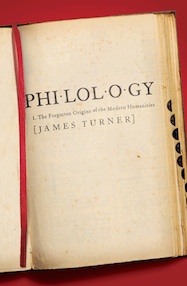Winner of the 2015 Christian Gauss Award
By Carol A. Leibiger
James Turner’s study recounts two intertwined histories: the development of modern humanities disciplines from philology and the growth of the edifices that house and sponsor erudition in humanities disciplines, e.g., the modern research university, its academic departments, and learned societies. Turner, Cavanaugh Professor of the Humanities at the University of Notre Dame, has devoted his career to the study of intellectual and religious history and has published extensively on topics covered in this book. He presents a sweeping historical treatment of his subject from c. 500 BCE to the early twentieth century.
Part I of this work comprises an overview of the early history of philology. Following a summary of its origin in classical antiquity and its transmission into modern times by medieval scholars, Turner identifies Renaissance Humanists like Erasmus as the originators of an empirical philology, focusing on the language, history, and social and cultural context of texts, that gave birth to the humanities. Beginning with the Reformation, Turner’s focus shifts to philology in the Anglophone world, demonstrating how the growth of the British Empire provided access to Indo-European languages beyond Europe, especially Sanskrit, that enabled the development of philological practice (e.g., the comparative method and the notion of the Stammbaum), allowing philologists to classify related languages and trace their development from a common ancestor.
In philological fashion, Turner sketches the splitting of the philological tree into its offspring disciplines during two periods: from 1800 to the mid-nineteenth century and then into the early twentieth century. Part II devotes individual chapters to the development of broadly conceived disciplines derived from philology’s main areas of inquiry, i.e., language and literature, history, and ethnology. Part III traces the furcation of these broader disciplines into today’s humanities disciplines (language, literature, history, classics and classical studies, biblical and religious studies, and art history) and disciplines like linguistics, anthropology, and archaeology now classified as social sciences. Increasing empiricism and subject knowledge derived from German erudition and empiricism, the founding and growth of learned societies and publications, and finally the compartmentalizing of disciplines into academic departments following the model of the German research university contributed to the birthing of modern academic humanistic and social sciences disciplines. Common to all of these disciplines is a set of “[c]ritical, historical, and textual practices” inherited from philology.
Turner’s work is a tour de force of intellectual history that is awe-inspiring in its depth and breadth. The author’s writing is generally precise, graceful, and felicitous; his prose includes humorous gems (e.g., a list that includes “the kitchen sink”). For a work of this density, some illustrative matter would be welcome, both to break up the extremely detailed, text-heavy presentation and to provide some visual elucidation of the contents (for instance, a Stammbaum diagram depicting philology and her offspring would have been both appropriate and helpful). While Turner is obviously at home in most of the content, especially the treatment of history and religion, it is ironic that he seems less knowledgeable when discussing philology in a work dedicated to that subject. For instance, he imprecisely identifies Visigothic as “a language remotely related to Anglo-Saxon” and “Frankish” as Old High German. The former language is more remotely related across time and space than in terms of kinship (Gothic was a “cousin” of Anglo-Saxon that flourished some 200 years earlier on the Black Sea); Franconian (Fränkisch) represented three dialects of the five that comprised Old High German. While such deficiencies might be irksome to philologists like this reviewer, they are minor defects in a work of this scope.
This book has justifiably been the recipient of several prestigious awards. In 2014 it was one of The Times Literary Supplement’s Books of the Year, and this year it won honorable mention for the Association of American Publishers’ PROSE Award in Language and Linguistics. Most recently is has been awarded Phi Beta Kappa’s Christian Gauss Award for excellence in the field of literary scholarship or criticism. It is suitably ironic that Turner’s metadisciplinary work has been selected for prizes dedicated to one or more of philology’s disciplinary offspring. Given our modern disciplinary context, this book deserves to be honored by all of philology’s children.
Carol A. Leibiger (ΦΒΚ, University of Connecticut, 1977) is Associate Professor in the University Libraries at the University of South Dakota and a resident member of the Alpha of South Dakota Chapter of Phi Beta Kappa.




